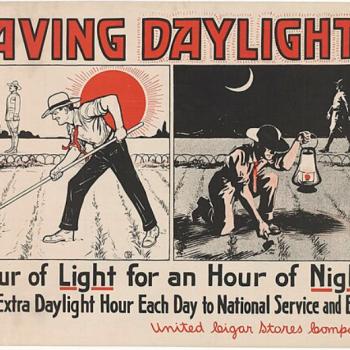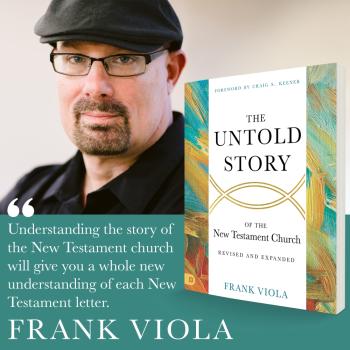Editors' Note: This article is part of the Public Square 2014 Summer Series: Conversations on Religious Trends. Read other perspectives from the Progressive Christian community here.
When it comes to approaching scripture, both liberals and conservatives are plagued with the same intellectual illness. Each side, on North American soil, have reacted to the other, which led to each side exposing the worst kind of theology there is: reactionary theology. "We're not them" became the modus operandi of both conservatives and liberals. Liberals shied away from evangelism and favored their precious "social gospel." Conversely, conservatives ramped up their evangelistic efforts and anathematized the social gospel. Of course, I understand that my observations are broad generalizations. Nevertheless, they do get at some kernel of truth. In both instances, their respective points were ironically the same: "We're not them."
This game of reactionary ping-pong actually marginalized the Scripture. One side's inerrant commitment to the Bible led to a bibliolatry buttressed by cold, creedal readings of Scriptures. These "empirical" interpretations were supposedly objective. As conservatives saw it, the scriptural text rendered only one meaning for all time and places. So much for the "living and active" word (Hebrews 4:12)! Obviously this presupposition collapses at the first challenge. All one has to do is look at all the infighting within the conservative ranks to see that the timeless, objective meaning of the text has never been all that clearly objective or objectively clear. Moreover, the past always trumped the present. All new interpretations were suspect; they have been too contaminated by contemporary "sins" like women's liberation and socialism. With this hermeneutical move, conservatives have boldly declared, without much challenge: "The Bible is ours!"
On the other side, the liberals developed a bad case of biblical allergy, only willing to engage the Bible in deconstructing ways. The Bible became for them the "before" picture in a "before and after" sequence. The "after" was belief as defined by modern sensibilities, for as the assumption goes, our modern sensibilities are, well, sensible. Drunk with generational hubris, liberals believed that today's believers—that is, us—are smarter and wiser and more credible than our ancestors. (What has Irenaeus to do with Bultmann?) The liberal "hermeneutic of suspicion" overthrew any semblance of a hermeneutic of trust. So when asked, "What does the Bible say about this?" the liberal said, "The Bible who?"
A new way—a third way—is emerging, particularly among younger believers. This new way is neither fully conservative nor fully liberal. These staid conventions, these languid labels, are no longer apt or useful. This new tradition of readers is renewing its commitment to Scripture in life-generative ways, transcending the trite tirades of old and moving beyond reactionary concerns about either the credibility of inerrancy or the contemporary desire to deconstruct everything.
Though it is impossible to pin down, this third way bears two distinct marks that deserve mentioning. First, the Scripture is again being treated as scripture. In the old battles, the conservative camp, with its loyalty to the inerrancy claim, treated Scripture as god; conversely, liberals slowly moved toward Scripture as text. In fact, as nothing more than any other text! These new third-way readers wish to respect the 1,800-year witness of the Church, pre-higher criticism, and recognize that the great cloud of readers who prepared the way for us recognized something holy in the Canon, and we should come to this sacred text with this reverence as well. The new reader is sacramental in her reading.
Second, the Bible is the starting point, not the end point. This is an obvious affront to the common saying among certain circles: "The Bible says it, I believe it, that settles it!" The Bible itself, within its canonical contours, embodies an initiative function. It refuses closure at every turn. A prime example is an exodus narrative, which gets reopened again and again, unleashing new interpretive potentialities along the way. The psalmist, the prophet, and Paul all revisit the exodus story, treating it as it should be treated: a starting point in the process of divine revelation. Less obviously so, the Bible as starting point also challenges the liberal reader who stereotypically begins with the ideology and then finds the comfortable and corresponding verses to support the ideology. This, too, distorts Scripture into an end point—on a non-point! The new reader begins with Scripture and dares to sojourn wherever the sacred text leads.




